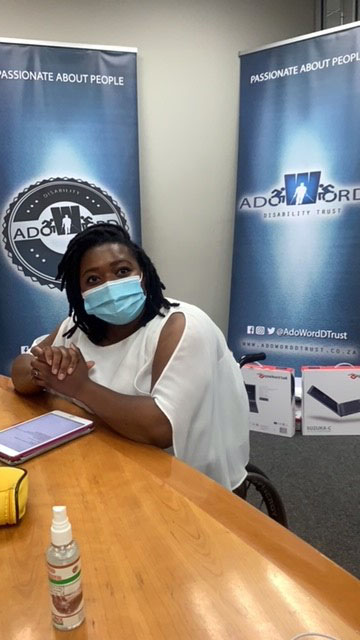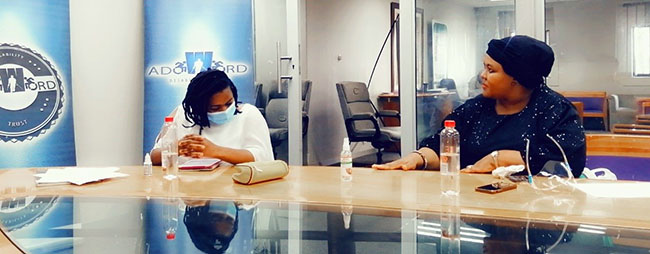News & Events
Significant donations touch student lives
Unisa Tshwane Region’s Forum for Students with Disabilities in collaboration with AdoWord Disability Trust held a ceremony in mid-December 2020 at the Tshwane municipality offices to hand over laptops to seven Unisa students with disabilities. Due to the COVID-19 regulations, the ceremony was attended strictly by beneficiaries of the laptops and representatives from the forum, trust and Unisa’s Advocacy and Resource Centre for Students with Disabilities (ARCSWiD).

Nonhlanhla Bakasa
The founder of AdoWord Disability Trust, Nonhlanhla Bakasa, says the trust is primarily aimed at the development of the youth and persons with disabilities. “We get funds for projects that have a meaningful and positive effect on these communities. Our project funder, Matla A Sechaba Community Development Trust, is the reason why the project was a success. Furthermore, the forum assisted us with gathering information that was needed, as well as preparing for the handover ceremony,” she adds.
Inspired by her own story as a Unisa student with a disability, Bakasa is aware of the challenges that these students experience. Wanting to bring a solution to a problem, when the project funder asked if she had a project in mind, she thought of something that would touch the lives of students. The information that was gathered reveals that most students with disabilities need laptops as one of the assistive devices.
The beneficiaries were elected after the forum ran a survey to determine the kind of assistance students with disabilities need, and a few that responded were chosen. However, the beneficiaries of the National Student Financial Aid Scheme (NSFAS) did not qualify to benefit. Due to budget constraints, the forum was able to assist a few students and hope to assist more in future.
The Deputy Chairperson of the Unisa Tshwane Region’s Forum for Students with Disabilities, Dineo Moseki, says students who do not have assistive devices find it challenging to study effectively. “We are grateful to the donors who have made the project possible. Some students with disabilities missed the 2020 academic year or could not write their examinations due to a lack of resources and of computer skills. As we communicate with them daily, we notice that even those with laptops or smart phones need urgent training to use platforms such as myUnisa and Turnitin,” he explains.
One of the beneficiaries, Mangakane Brigette Mathabathe, a BA in Administration student, says she is happy to have been a beneficiary as it was difficult for her to adjust without the assistive device. “I am now able to submit my assignments and write online examinations from home,” she adds.
Another beneficiary, Tshepho Mokgahlane, an LLB student, expresses that the announcement of online examinations was a ‘blow’ for some students, as they did not have laptops. “It also was not easy for Braille users to migrate to electronic study material, as it required a laptop or computer, so the donation came at the right time. Having a laptop is no longer a luxury but a necessity, and access to one assists students to study effectively,” he says.

From left: Nonhlanhla Bakasa (Founder of AdoWord Disability Trust) and Prof. Sindile Ngubane-Mokiwa (Acting Deputy Director of ARCSWiD)
The Acting Deputy Director of ARCSWiD, Professor Sindile Ngubane-Mokiwa, concludes: “As Unisa has moved to full online learning and assessment due to the COVID-19 pandemic, it is crucial that the university finds ways of ensuring that all students have access to learning tools from the beginning of the year. In the case of students with disabilities, it means access to assistive technologies that can enable them to have positive learning experiences. It is therefore my sincere hope that there will be a review of all policies and systems to respond to the ‘new normal’.”
*By Nancy Legodi, Acting Journalist, Department of Institutional Advancement
Publish date: 2021/02/02
